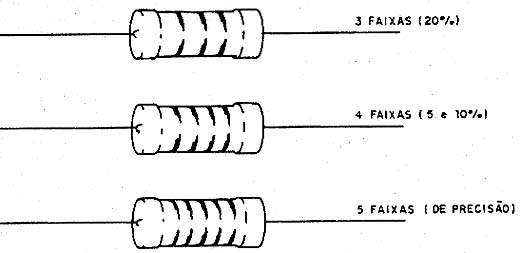
| COLOR | Significant figures | Multiplier | Tolerance | Temperature Coefficient ppm/oC |
| Black | 0 | 1 | - | - |
| Brown | 1 | 10 | 1% | 100 |
| Red | 2 | 100 | 2% | 50 |
| Orange | 3 | 1 000 | - | 15 |
| Yellow | 4 | 10 000 | - | 25 |
| Green | 5 | 100 000 | 0.5% | - |
| Blue | 6 | 1 000 000 | 0.25% | 10 |
| Violet | 7 | 10,000,000 | 0.1% | 5 |
| Gray | 8 | 100,000,000 | 0.05% | - |
| White | 9 | 1,000,000,000 | - | 1 |
| Gold | - | 0.1 | 5% | - |
| Silver | - | 0.01 | 10% | - |
Observations:
1. If the resistor is a 3 band type, the tolerance can be assumed as 20%
2. If the resistor is a 3 or 4 band type the temperature coefficient is not indicated.
Example: A resistor have bands in the next sequence of colors: red, violet, orange and silver (the sequence to read the strips or bands is from the end to the center).
Band 1 and 2, forms the number 27.
Band 3 indicates that we must multiply this value by 1 000. The resistance becames of 27 000 ohms.
Band 4 indicates that the tolerance is 10%.



